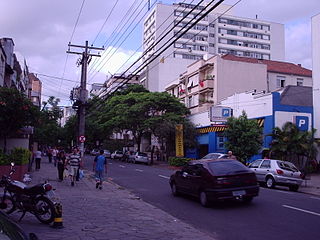
Salgado Filho International Airport is the airport serving Porto Alegre, Brazil. It is named after the Senator and first Minister of the Brazilian Air Force Joaquim Pedro Salgado Filho (1888–1950). It is operated by Fraport.

Participatory budgeting (PB) is a process of democratic deliberation and decision-making, in which ordinary people decide how to allocate part of a municipal or public budget. Participatory budgeting allows citizens to identify, discuss, and prioritize public spending projects, and gives them the power to make real decisions about how money is spent.

Canoas, which earned city status in 1939, is a municipality in the Brazilian state of Rio Grande do Sul. With more than 300,000 inhabitants, it is part of the Porto Alegre conurbation and has the second highest GDP in the state. It is also the fourth largest city in the state by population. Canoas boasts a strong manufacturing-based economy and is the home of the Canoas Air Force Base, used by the Brazilian Air Force.

Alvorada is a city in Rio Grande do Sul, Brazil, adjacent to the city of Porto Alegre. The city is also known as "The Capital of Solidarity." Alvorada is primarily a bedroom community with most workers commuting to adjacent cities such as Porto Alegre to work. Alvorada is built around its main road: Avenida Presidente Vargas. The name means "the awakening" or "the sunrise".

Manuel José de Araújo Porto-Alegre, Baron of Santo Ângelo, was a Brazilian Romantic writer, painter, architect, diplomat and professor, considered to be one of the first Brazilian editorial cartoonists ever. He is the patron of the 32nd chair of the Brazilian Academy of Letters.
The government of Porto Alegre, bound to the Porto Alegre City Charter, is a mayor-council form of government, which is mandated by the Brazilian Constitution of 1988. The government of Porto Alegre is responsible for primary education, healthcare, libraries, parks and open spaces, sanitation, water supply, and youth correctional services.

Independência is a tiny neighborhood of the city of Porto Alegre, the state capital of Rio Grande do Sul in Brazil.

Cidade Baixa is a neighborhood of the city of Porto Alegre, the state capital of Rio Grande do Sul in Brazil.

Centro Histórico is a neighborhood of the city of Porto Alegre, the state capital of Rio Grande do Sul in Brazil.

Boa Vista is a neighbourhood of the city of Porto Alegre, the state capital of Rio Grande do Sul, Brazil. It was created by Law 2022 from December 7, 1959.

Praia de Belas is a neighborhood of the city of Porto Alegre, the state capital of Rio Grande do Sul, Brazil. It was created by Law 2022 from December 7, 1959.

Bela Vista is a neighborhood of the city of Porto Alegre, the state capital of Rio Grande do Sul in Brazil. It was created by Law 2022 of December 7, 1959. Bela Vista is characterized by its apartament buildings, some of which are very sophisticated, embracing people from the upper middle class to the upper class.

Bom Fim is a neighborhood in the city of Porto Alegre, the state capital of Rio Grande do Sul in Brazil. It was created by Law 2022 from December 7, 1959.

Higienópolis is a neighborhood in the city of Porto Alegre, the state capital of Rio Grande do Sul in Brazil.

Passo d'Areia is a neighborhood (bairro) in the city of Porto Alegre, the state capital of Rio Grande do Sul in Brazil. Two big shopping malls of the city, Iguatemi and Bourbon Country, are located here.

Três Figueiras is a neighbourhood of the city of Porto Alegre, the state capital of Rio Grande do Sul, Brazil. A residential neighbourhood, it embrace people from upper middle class to upper class, having lots of sophisticated houses. Três Figueiras was created by Law 2022 of December 7, 1959. There is located the Design School of Unisinos. Also, there has two highly regarded and traditional private schools, the Farroupilha and Anchieta schools, and a highly regarded private school for childhood, the Baby House.

Partenon is a neighbourhood in the city of Porto Alegre, the state capital of Rio Grande do Sul, Brazil. It was created by Law 2022 from December 7, 1959.
Agronomia is a neighbourhood (bairro) in the city of Porto Alegre, the state capital of Rio Grande do Sul, Brazil. It was created by Law 4166 from September 21, 1976, but had its limits modified in 1990 and 1997.
João Pessoa may refer to:





















